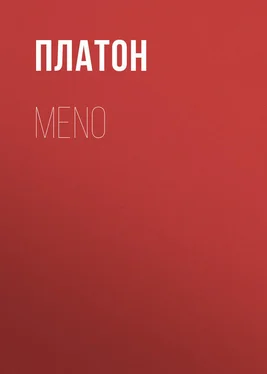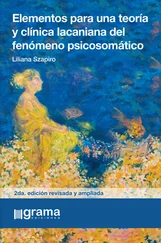Платон - Meno
Здесь есть возможность читать онлайн «Платон - Meno» — ознакомительный отрывок электронной книги совершенно бесплатно, а после прочтения отрывка купить полную версию. В некоторых случаях можно слушать аудио, скачать через торрент в формате fb2 и присутствует краткое содержание. Жанр: Философия, foreign_antique, foreign_prose, на английском языке. Описание произведения, (предисловие) а так же отзывы посетителей доступны на портале библиотеки ЛибКат.
- Название:Meno
- Автор:
- Жанр:
- Год:неизвестен
- ISBN:нет данных
- Рейтинг книги:5 / 5. Голосов: 1
-
Избранное:Добавить в избранное
- Отзывы:
-
Ваша оценка:
- 100
- 1
- 2
- 3
- 4
- 5
Meno: краткое содержание, описание и аннотация
Предлагаем к чтению аннотацию, описание, краткое содержание или предисловие (зависит от того, что написал сам автор книги «Meno»). Если вы не нашли необходимую информацию о книге — напишите в комментариях, мы постараемся отыскать её.
Meno — читать онлайн ознакомительный отрывок
Ниже представлен текст книги, разбитый по страницам. Система сохранения места последней прочитанной страницы, позволяет с удобством читать онлайн бесплатно книгу «Meno», без необходимости каждый раз заново искать на чём Вы остановились. Поставьте закладку, и сможете в любой момент перейти на страницу, на которой закончили чтение.
Интервал:
Закладка:
The character of Meno, like that of Critias, has no relation to the actual circumstances of his life. Plato is silent about his treachery to the ten thousand Greeks, which Xenophon has recorded, as he is also silent about the crimes of Critias. He is a Thessalian Alcibiades, rich and luxurious – a spoilt child of fortune, and is described as the hereditary friend of the great king. Like Alcibiades he is inspired with an ardent desire of knowledge, and is equally willing to learn of Socrates and of the Sophists. He may be regarded as standing in the same relation to Gorgias as Hippocrates in the Protagoras to the other great Sophist. He is the sophisticated youth on whom Socrates tries his cross-examining powers, just as in the Charmides, the Lysis, and the Euthydemus, ingenuous boyhood is made the subject of a similar experiment. He is treated by Socrates in a half-playful manner suited to his character; at the same time he appears not quite to understand the process to which he is being subjected. For he is exhibited as ignorant of the very elements of dialectics, in which the Sophists have failed to instruct their disciple. His definition of virtue as 'the power and desire of attaining things honourable,' like the first definition of justice in the Republic, is taken from a poet. His answers have a sophistical ring, and at the same time show the sophistical incapacity to grasp a general notion.
Anytus is the type of the narrow-minded man of the world, who is indignant at innovation, and equally detests the popular teacher and the true philosopher. He seems, like Aristophanes, to regard the new opinions, whether of Socrates or the Sophists, as fatal to Athenian greatness. He is of the same class as Callicles in the Gorgias, but of a different variety; the immoral and sophistical doctrines of Callicles are not attributed to him. The moderation with which he is described is remarkable, if he be the accuser of Socrates, as is apparently indicated by his parting words. Perhaps Plato may have been desirous of showing that the accusation of Socrates was not to be attributed to badness or malevolence, but rather to a tendency in men's minds. Or he may have been regardless of the historical truth of the characters of his dialogue, as in the case of Meno and Critias. Like Chaerephon (Apol.) the real Anytus was a democrat, and had joined Thrasybulus in the conflict with the thirty.
The Protagoras arrived at a sort of hypothetical conclusion, that if 'virtue is knowledge, it can be taught.' In the Euthydemus, Socrates himself offered an example of the manner in which the true teacher may draw out the mind of youth; this was in contrast to the quibbling follies of the Sophists. In the Meno the subject is more developed; the foundations of the enquiry are laid deeper, and the nature of knowledge is more distinctly explained. There is a progression by antagonism of two opposite aspects of philosophy. But at the moment when we approach nearest, the truth doubles upon us and passes out of our reach. We seem to find that the ideal of knowledge is irreconcilable with experience. In human life there is indeed the profession of knowledge, but right opinion is our actual guide. There is another sort of progress from the general notions of Socrates, who asked simply, 'what is friendship?' 'what is temperance?' 'what is courage?' as in the Lysis, Charmides, Laches, to the transcendentalism of Plato, who, in the second stage of his philosophy, sought to find the nature of knowledge in a prior and future state of existence.
The difficulty in framing general notions which has appeared in this and in all the previous Dialogues recurs in the Gorgias and Theaetetus as well as in the Republic. In the Gorgias too the statesmen reappear, but in stronger opposition to the philosopher. They are no longer allowed to have a divine insight, but, though acknowledged to have been clever men and good speakers, are denounced as 'blind leaders of the blind.' The doctrine of the immortality of the soul is also carried further, being made the foundation not only of a theory of knowledge, but of a doctrine of rewards and punishments. In the Republic the relation of knowledge to virtue is described in a manner more consistent with modern distinctions. The existence of the virtues without the possession of knowledge in the higher or philosophical sense is admitted to be possible. Right opinion is again introduced in the Theaetetus as an account of knowledge, but is rejected on the ground that it is irrational (as here, because it is not bound by the tie of the cause), and also because the conception of false opinion is given up as hopeless. The doctrines of Plato are necessarily different at different times of his life, as new distinctions are realized, or new stages of thought attained by him. We are not therefore justified, in order to take away the appearance of inconsistency, in attributing to him hidden meanings or remote allusions.
There are no external criteria by which we can determine the date of the Meno. There is no reason to suppose that any of the Dialogues of Plato were written before the death of Socrates; the Meno, which appears to be one of the earliest of them, is proved to have been of a later date by the allusion of Anytus.
We cannot argue that Plato was more likely to have written, as he has done, of Meno before than after his miserable death; for we have already seen, in the examples of Charmides and Critias, that the characters in Plato are very far from resembling the same characters in history. The repulsive picture which is given of him in the Anabasis of Xenophon, where he also appears as the friend of Aristippus 'and a fair youth having lovers,' has no other trait of likeness to the Meno of Plato.
The place of the Meno in the series is doubtfully indicated by internal evidence. The main character of the Dialogue is Socrates; but to the 'general definitions' of Socrates is added the Platonic doctrine of reminiscence. The problems of virtue and knowledge have been discussed in the Lysis, Laches, Charmides, and Protagoras; the puzzle about knowing and learning has already appeared in the Euthydemus. The doctrines of immortality and pre-existence are carried further in the Phaedrus and Phaedo; the distinction between opinion and knowledge is more fully developed in the Theaetetus. The lessons of Prodicus, whom he facetiously calls his master, are still running in the mind of Socrates. Unlike the later Platonic Dialogues, the Meno arrives at no conclusion. Hence we are led to place the Dialogue at some point of time later than the Protagoras, and earlier than the Phaedrus and Gorgias. The place which is assigned to it in this work is due mainly to the desire to bring together in a single volume all the Dialogues which contain allusions to the trial and death of Socrates.
ON THE IDEAS OF PLATO
Plato's doctrine of ideas has attained an imaginary clearness and definiteness which is not to be found in his own writings. The popular account of them is partly derived from one or two passages in his Dialogues interpreted without regard to their poetical environment. It is due also to the misunderstanding of him by the Aristotelian school; and the erroneous notion has been further narrowed and has become fixed by the realism of the schoolmen. This popular view of the Platonic ideas may be summed up in some such formula as the following: 'Truth consists not in particulars, but in universals, which have a place in the mind of God, or in some far-off heaven. These were revealed to men in a former state of existence, and are recovered by reminiscence (anamnesis) or association from sensible things. The sensible things are not realities, but shadows only, in relation to the truth.' These unmeaning propositions are hardly suspected to be a caricature of a great theory of knowledge, which Plato in various ways and under many figures of speech is seeking to unfold. Poetry has been converted into dogma; and it is not remarked that the Platonic ideas are to be found only in about a third of Plato's writings and are not confined to him. The forms which they assume are numerous, and if taken literally, inconsistent with one another. At one time we are in the clouds of mythology, at another among the abstractions of mathematics or metaphysics; we pass imperceptibly from one to the other. Reason and fancy are mingled in the same passage. The ideas are sometimes described as many, coextensive with the universals of sense and also with the first principles of ethics; or again they are absorbed into the single idea of good, and subordinated to it. They are not more certain than facts, but they are equally certain (Phaedo). They are both personal and impersonal. They are abstract terms: they are also the causes of things; and they are even transformed into the demons or spirits by whose help God made the world. And the idea of good (Republic) may without violence be converted into the Supreme Being, who 'because He was good' created all things (Tim.).
Читать дальшеИнтервал:
Закладка:
Похожие книги на «Meno»
Представляем Вашему вниманию похожие книги на «Meno» списком для выбора. Мы отобрали схожую по названию и смыслу литературу в надежде предоставить читателям больше вариантов отыскать новые, интересные, ещё непрочитанные произведения.
Обсуждение, отзывы о книге «Meno» и просто собственные мнения читателей. Оставьте ваши комментарии, напишите, что Вы думаете о произведении, его смысле или главных героях. Укажите что конкретно понравилось, а что нет, и почему Вы так считаете.











